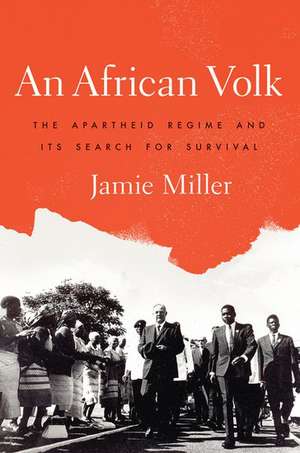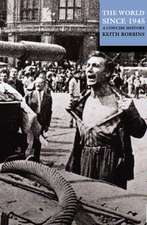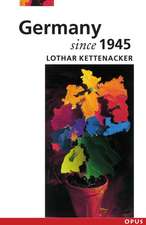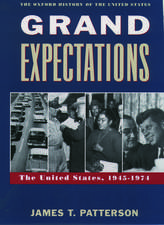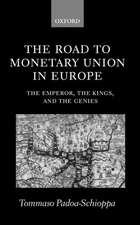An African Volk: The Apartheid Regime and Its Search for Survival
Autor Jamie Milleren Limba Engleză Hardback – 17 noi 2016
| Toate formatele și edițiile | Preț | Express |
|---|---|---|
| Paperback (1) | 355.55 lei 3-5 săpt. | |
| Oxford University Press – 16 oct 2019 | 355.55 lei 3-5 săpt. | |
| Hardback (1) | 691.01 lei 10-16 zile | |
| Oxford University Press – 17 noi 2016 | 691.01 lei 10-16 zile |
Preț: 691.01 lei
Preț vechi: 793.63 lei
-13% Nou
Puncte Express: 1037
Preț estimativ în valută:
132.24€ • 137.55$ • 109.17£
132.24€ • 137.55$ • 109.17£
Carte disponibilă
Livrare economică 11-17 martie
Preluare comenzi: 021 569.72.76
Specificații
ISBN-13: 9780190274832
ISBN-10: 0190274832
Pagini: 462
Ilustrații: 34 illus.
Dimensiuni: 163 x 239 x 33 mm
Greutate: 0.79 kg
Editura: Oxford University Press
Colecția OUP USA
Locul publicării:New York, United States
ISBN-10: 0190274832
Pagini: 462
Ilustrații: 34 illus.
Dimensiuni: 163 x 239 x 33 mm
Greutate: 0.79 kg
Editura: Oxford University Press
Colecția OUP USA
Locul publicării:New York, United States
Recenzii
Jamie Miller's An African Volk: The Apartheid Regime and the Search for Survival is the first in-depth study, based on primary sources, of Vorster's efforts to secure for South Africa a better image in the international community and attract allies in the independent African states in Southern Africa. Miller tells this entire story with great aplomb. His book is in my view the most outstanding debut of an historian of South Africa that has appeared in the last thirty to forty years....With An African Volk: The Apartheid Regime and its Search for Survival Miller has made a seminal contribution to both Cold War history and to the study of the crucial stages of the transition to black rule in Southern Africa.
[I]mpressive....[N]o one has researched this story in anything like the depth he has, and the result is a major contribution to knowledge of the ideology and discourse of the apartheid state in relation to the rest of Africa....[H]is book will, without doubt, long remain a key work on apartheid foreign policy in the 1970s.
Jamie Miller's analysis of apartheid diplomacy in the 1970s... delivers two important points: that local political agendas mattered to the global history of the Cold War and that international developments prompted ideological reassessment in Afrikaner nationalist circles... Miller's close reading of Afrikaner politics supports his assertion that regional specifics mattered in the Cold War. His analysis also undermines assumptions about the power of international whiteness. Even within Afrikanerdom, there were differences about whose white privilege merited protection and how it might be achieved
this is a valuable and important study in presenting Vorster's diplomatic efforts and his emphasis on 'multinational' 'separate development,' ... as intimately linked and more than a cynical ploy, and in questioning claims in published sources through rigorous archival research. Above all, Miller refreshingly takes seriously arguments by and between Afrikaners themselves, regardless of how much he rejects such thinking.
An African Volk is the first in-depth study, based on primary sources, of Vorster's efforts to secure for South Africa a better image in the international community and attract allies in the independent African states in Southern Africa Miller tells this entire story with great aplomb. An African Volk is in my view the most outstanding debut of an historian of South Africa that has appeared in the last thirty to forty years The book is based on a very wide range of primary sources in the archives of several countries and on personal interviews with many of the main actors. Proficient in Afrikaans, the language of most white political leaders and civil servants, Miller was able to develop an acute understanding of the dynamics of Afrikaner politics and the often contradictory goals of the Department of Foreign Affairs and the military establishment.
Miller's book offers fascinating insights into the internal struggles of the apartheid regime as it tried to project its legitimacy and ensure its survival in the post-colonial, Cold War world. In this meticulously researched account, the author reveals the ways in which apartheid's ideologues appropriated language used against apartheid in an attempt to strengthen it, emphasizing the Africanness of the volk in an era of nationalism and decolonization, the nation-building claims of separate development, and the anti-communist consensus that bound White South Africa to the West.
This book is an exceptionally lucid, bold, and incisive study of the foreign policy of John Vorster. It shows vividly how after some enterprising attempts to engage African leaders, Vorster intervened in Angola in 1975, seeking to secure Afrikaner survival in terms that made the attainment of that goal impossible, and leaving him a tragic figure.
A long overdue look at the perceptions, ideology, and foreign policy of South Africa's apartheid regime during the 1970s, Miller's account is a challenge to conventional wisdom about the Cold War in Southern Africa and a significant contribution to the history of South Africa during a critical decade.
Miller's patient and careful reading of declassified South African documents tells us something new about apartheid and its relations to the countries north of the Limpopo. In the twenty years before 1994, the apartheid regime struggled, sometimes by encouraging considerable violence and sometimes at odds with the South African military, to locate and legitimate white-ruled South Africa in an anti-imperialist world of new nations.
This finely realized study of apartheid statecraft considerably deepens our understanding of the regional dynamics of South African power in the 1970s. Miller's astute analysis of Pretoria's realpolitik shows the ambitions and limits of political reforms in the era prior to the revival of mass resistance to apartheid in the 1980s.
Jamie Miller's important new book is perhaps the most successful monograph-length attempt to integrate a wide-ranging use of particularly South African, US and Rhodesian sources into a study of Pretoria's foreign policy during John Vorster's tenure as prime minister (196678). Based on a Cambridge PhD, its utilization of archival research, hard to find memoirs, newspapers and interviews makes it worthy of serious consideration ... this is perhaps the most important book written about South African foreign policy in the mid-Cold War era. The archival research, the interviews, and the wide reading in obscure publications will ensure that anyone who has an interest in apartheid and South African foreign policy will need to read this book and engage with its ideas.
[I]mpressive....[N]o one has researched this story in anything like the depth he has, and the result is a major contribution to knowledge of the ideology and discourse of the apartheid state in relation to the rest of Africa....[H]is book will, without doubt, long remain a key work on apartheid foreign policy in the 1970s.
Jamie Miller's analysis of apartheid diplomacy in the 1970s... delivers two important points: that local political agendas mattered to the global history of the Cold War and that international developments prompted ideological reassessment in Afrikaner nationalist circles... Miller's close reading of Afrikaner politics supports his assertion that regional specifics mattered in the Cold War. His analysis also undermines assumptions about the power of international whiteness. Even within Afrikanerdom, there were differences about whose white privilege merited protection and how it might be achieved
this is a valuable and important study in presenting Vorster's diplomatic efforts and his emphasis on 'multinational' 'separate development,' ... as intimately linked and more than a cynical ploy, and in questioning claims in published sources through rigorous archival research. Above all, Miller refreshingly takes seriously arguments by and between Afrikaners themselves, regardless of how much he rejects such thinking.
An African Volk is the first in-depth study, based on primary sources, of Vorster's efforts to secure for South Africa a better image in the international community and attract allies in the independent African states in Southern Africa Miller tells this entire story with great aplomb. An African Volk is in my view the most outstanding debut of an historian of South Africa that has appeared in the last thirty to forty years The book is based on a very wide range of primary sources in the archives of several countries and on personal interviews with many of the main actors. Proficient in Afrikaans, the language of most white political leaders and civil servants, Miller was able to develop an acute understanding of the dynamics of Afrikaner politics and the often contradictory goals of the Department of Foreign Affairs and the military establishment.
Miller's book offers fascinating insights into the internal struggles of the apartheid regime as it tried to project its legitimacy and ensure its survival in the post-colonial, Cold War world. In this meticulously researched account, the author reveals the ways in which apartheid's ideologues appropriated language used against apartheid in an attempt to strengthen it, emphasizing the Africanness of the volk in an era of nationalism and decolonization, the nation-building claims of separate development, and the anti-communist consensus that bound White South Africa to the West.
This book is an exceptionally lucid, bold, and incisive study of the foreign policy of John Vorster. It shows vividly how after some enterprising attempts to engage African leaders, Vorster intervened in Angola in 1975, seeking to secure Afrikaner survival in terms that made the attainment of that goal impossible, and leaving him a tragic figure.
A long overdue look at the perceptions, ideology, and foreign policy of South Africa's apartheid regime during the 1970s, Miller's account is a challenge to conventional wisdom about the Cold War in Southern Africa and a significant contribution to the history of South Africa during a critical decade.
Miller's patient and careful reading of declassified South African documents tells us something new about apartheid and its relations to the countries north of the Limpopo. In the twenty years before 1994, the apartheid regime struggled, sometimes by encouraging considerable violence and sometimes at odds with the South African military, to locate and legitimate white-ruled South Africa in an anti-imperialist world of new nations.
This finely realized study of apartheid statecraft considerably deepens our understanding of the regional dynamics of South African power in the 1970s. Miller's astute analysis of Pretoria's realpolitik shows the ambitions and limits of political reforms in the era prior to the revival of mass resistance to apartheid in the 1980s.
Jamie Miller's important new book is perhaps the most successful monograph-length attempt to integrate a wide-ranging use of particularly South African, US and Rhodesian sources into a study of Pretoria's foreign policy during John Vorster's tenure as prime minister (196678). Based on a Cambridge PhD, its utilization of archival research, hard to find memoirs, newspapers and interviews makes it worthy of serious consideration ... this is perhaps the most important book written about South African foreign policy in the mid-Cold War era. The archival research, the interviews, and the wide reading in obscure publications will ensure that anyone who has an interest in apartheid and South African foreign policy will need to read this book and engage with its ideas.
Notă biografică
Jamie Miller is a Postdoctoral Fellow in the Department of History at the University of Pittsburgh. He received his PhD from the University of Cambridge and has held fellowships at Yale University and Cornell University.
